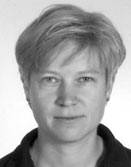Profile
-
OrganizationArizona State University
-
Telephone(480) 965-5323
-
Address(s)Alexandra Ros
Arizona State University
PO Box 871604
Tempe, AZ 85287
-
Biography
Dr. Ros received her PhD in Chemistry from the Swiss Federal Institute of Technology in Lausanne (EPFL, Switzerland) in 2000, where she started developing methods for protein analysis. She joined the Experimental Biophysics Group at Bielefeld University, Germany, as postdoc in 2000 and received her Habilitation in Experimental Physics in 2007 at the same institution. During this time she developed cutting-edge separation tools for particles and biomoclecules in microenvironments. Since 2008, she holds a faculty position at Arizona State University (ASU) in the division of analytical chemistry. Dr. Ros’ research currently focuses on bioanalytical microfluidics. Her major interests include the development of analytical techniques exploiting micro- and nanoenvironments to develop novel migration phenomena and separation techniques, single cell analysis and tools for nanocrystallography. She currently holds an NSF Career Award for her innovative proposal on DNA dielectrophoresis and applications for DNA separation and analysis.
Dr. Ros uses her expertise in bioanalytical microfluidics and teams with the STC collaborators in developing novel tools for protein crystallography. She is in particular interested in developing novel microfluidic methodology for size fractionation of protein crystals in the sub-micrometer range and microfluidic devices to reveal the regimes of nanocrystal growth. In the past, Dr. Ros and coworkers have shown a microfluidic sorter based on dielectrophoresis to fractionate photosystem I crystals into size fractions as small as 100 nm. Microfluidic crystallization coupled to numerical simulation also successfully demonstrated the regimes of photosystem I crystal growth. Dr. Ros will support the BioXFEL team with these innovative approaches and further improve microfluidic tools for BioXFEL.
The Ros lab will develop novel microfluidic tools for protein crystallography. A focus lies on tools to fractionate crystals into homogeneous size fractions for improved structure determination. BioXFEL will also be supported with the development of novel microfluidic approaches for sample injection and characterization of nanocrystal growth.




